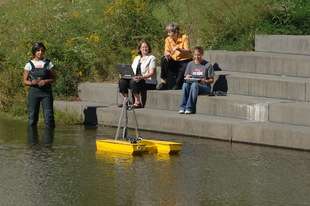Robotic Boat Geared to Simplify Life for Scientists

Though it looks like a miniature yellow catamaran, a craft designed by professors and students at Rowan University is not your father’s toy boat.
Indeed, the wooden boat actually is a robotic flotation device and research tool called Interactive Mobile Aqua Probing & Surveillance or IMAPS. Faculty and students in the College of Engineering and the Biological Sciences Department in the College of Liberal Arts & Sciences—both of which emphasize experimental design and hands-on learning—collaborated on IMAPS. They designed the 4’x3’x1’, 50-pound, laptop computer-operated boat to sample water parameters as part of environmental research and pollution monitoring.
The motor-driven IMAPS carries instruments that can measure water’s temperature; depth; and pH, dissolved oxygen, nitrite, nitrate and ammonia levels and features a camera that can show what’s below the water’s surface. With a laptop and Internet, a nearby or far away user can guide the IMAPS via a GPS device and onboard camera to different parts of a water body.
That’s an improvement over typical field sampling methods, which call for scientists to move in and out of water taking samples or travel from one spot to another via boat and then return the samples to a laboratory for analysis.
“IMAPS is very flexible. It can go into creeks, onto marshy surfaces and travel between tidal areas,” said Dr. Courtney Richmond, associate professor of biological sciences.
Dr. Patricia Mosto, interim associate provost and former chair of the Biological Sciences Department, initiated the idea with Dr. Hong Zhang, assistant professor of electrical and computer engineering. Mosto said, “There is nothing like this for small bodies of water. Most devices are attached to buoys or are manually submersible. Generally scientists on boats move from location to location getting samples by hand. With IMAPS, you can be in your office and it can sample a lake for you.”
“Although some current technologies provide a basic way to continuously observe fixed positions, their lack of crucial mobility and flexibility inspired our team to develop a robotic IMAPS device to monitor water pollution and study ecological conditions,” Zhang said. “Our goal is to enable students from anywhere to retrieve data collected by a fleet of IMAPS deployed in various locations.”
The team hopes one day to make the device available to others schools and researchers. “IMAPS is inexpensive to acquire and maintain while intuitive to operate. Many students, especially those at financially disadvantaged schools, can have unprecedented access to research equipment and be able to explore the wild or test water quality either (locally) or on a virtual field trip half world away.” Zhang said. He said IMAPS also will be a convenient tool for local communities to use, enabling a greater number of people to easily monitor water pollution and pinpoint a polluting source.
To date, 11 students have worked with Zhang, Mosto, Richmond and Dr. Gina Tang, assistant professor of electrical and computer engineering, on the project for the last 20 months. The team received a provisional patent for IMAPS in the spring.
This semester students and their professors are working on IMAPS II, an amphibious device that will be able to travel between land and water on its own power. It will be used to work on creeks, marshes and other difficult terrains.
Source: Rowan University





















